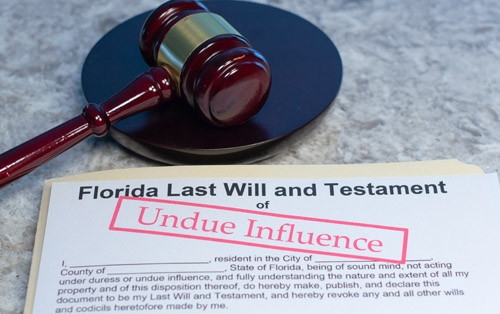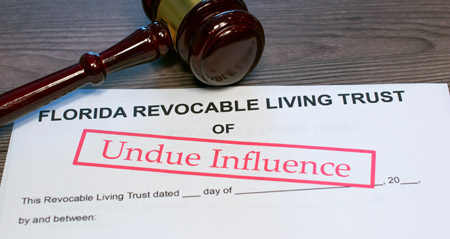Undue Influence Regarding Wills & Trusts
The term undue influence refers to someone acting in a certain manner outside their own free will or without awareness to the potential consequences. From a legal standpoint, this influence involves someone using a position of power to manipulate another individual into taking a specific action for their own personal gain.
One common example of this is a relative or family member taking advantage of an elderly individual and having them modify a will or trust in order to obtain a larger share of a family’s inheritance.
This article covers the topic of undue influence from a legal standpoint, particularly, regarding wills and trusts within the State of Florida. This includes: Florida’s laws on undue influence, how to legally prove it, and examples of this unfortunate occurrence.
Please note, content on this page is written to provide useful information to readers; however, it’s not a substitute for legal advice. If you have issues involving probate or a contested will, you should consult with an attorney for estate litigation.
Page Directory
Definitions
In order to help readers digest the content within this page, we’ve outlined some of the common legal terms relevant to the subject matter and included brief definitions of these terms below.
Will– Wills are legal documents which state in writing what should happen with someone’s belongings after they pass away. If this legal document is modified as a result of undue influence, the will can be contested in probate court and enter into litigation.
Trust – Similar to wills, trusts are also legal documents which dictate the terms of how someone’s assets are distributed. The main difference is, trusts provide funding throughout the course of someone’s life as opposed to only after they pass away. If trusts are altered based on unlawful influence, the trust may also be disputed in court.
Inheritance – Someone’s monetary assets they wish to pass on after they pass away. This is also commonly referred to as an “estate.”
Testator – The person who drafted the will or established the trust to dictate what happens to their assets and belongings if and when they pass away.
Beneficiary – The individual or group of individuals named in the will or trust to receive assets of the deceased individual.
Probate Administration – The legal process of distributing an individual’s assets to beneficiaries named within their estate plan. For wills, this process is typically referred to as probating a will. For trusts, this process is commonly referred to as trust administration. In cases where someone passed away without an estate plan, there’s a separate process known as Intestate Succession.
Notice of Administration – Formal notice given to beneficiaries, creditors, and other interested parties that someone passed away and the estate is entering into probate. This process differs for each state; however, it is often legally required by the personal representative in order to give people a chance to raise any possible legal objections over the administration of the estate.
Probate Court – The court responsible for overseeing the distribution of someone’s assets within a will or trust. This is handled in the local county court where someone resides at the time of death. For instance, if someone passes away in Miami, administration of their estate is handled through the probate court in Miami-Dade County. This is also the court where someone can dispute a will or trust based on undue influence or other legal reasons.
Decedent – The individual who passed away.
Examples Of Undue Influence
In regards to a will, or trust, undue influence happens when someone’s actions direct a vulnerable individual to write or change a legal document or transfer property. Of course, the influencer financially benefits from the will or trust.
For example, imagine an 80 year old widow/widower with declining mental abilities. Years ago, this person wrote a will and trust that divided assets equally between all children. The entire family received legal documents explaining this arrangement.
One day this parent passes away and the family finds out the legal document was changed mere months before their parent’s demise. The heirs learn that one sibling inherits the entire estate. Obviously, this causes family problems and may be an example of undue influence.
Undue influence may occur outside family members. Caregivers may coerce vulnerable, elderly seniors to sign documents transferring property. Neighbors may also take advantage of seniors with diminished mental capacity. Families must ensure the elderly are protected from this type of fraud. If you suspect a loved one has been a victim of this type of abuse contact an experienced attorney immediately.
Florida Laws On Undue Influence
The State of Florida has its own probate process for wills and trusts. This process gives someone a chance to legally object to the validity of a will or trust. One of these formal legal objections involves contesting the will on the grounds of undue influence.
 Undue Influence Over The Testator Of A Will
Undue Influence Over The Testator Of A Will
The 2019 Florida Statute (732.5165) protects vulnerable people from the effects of fraud, duress, mistake and undue influence. The statute states:
“A will is void if the expectation is procured by fraud, duress, mistake or undue influence. Any part of the will is void if so procured, but the remainder of the will not so procured shall be valid if it is not valid for other reasons. If the revocation of a will or any part thereof is procured by fraud, duress, mistake, or undue influence, such revocation is void.” (Florida Legislature, 2019, Probate Code: Intestate Succession and Wills)
So, various factors may affect the validity of a will; yet, undue influence remains the most common.
Undue Influence Over The Settlor Of A Trust
The 2019 Florida Statute (736.0406) protects the creator of a trust from fraud, duress, and undue influence. According to this statute:
“If the creation, amendment, or restatement of a trust is procured by fraud, duress, mistake, or undue influence, the trust or any part so procured is void. The remainder of the trust not procured by such means is valid if the remainder is not invalid for other reasons. If the revocation of a trust, or any part thereof, is procured by fraud, duress, mistake, or undue influence, such revocation is void.” (Florida Legislature, 2019, Florida Trust Code)
Similar to wills, various factors may influence the validity of a trust, and undue influence is one of the most common factors.
Proving This In Court
In 1971, a key Florida State Supreme Court case: Estate of Carpenter, 253 So.2d 697 (Fla. 1971) established factors regarding undue influence. The Supreme Court held that one may assume undue influence in cases where:
- Someone benefits from the will
- A person had a confidential relationship with the decedent
- The person was actively involved in procuring the will
In order to prove someone was actively involved in procuring the will, the Carpenter case provided seven factors as a guide.

- Presence of beneficiary at will’s execution
- Presence of beneficiary at times when the testator expressed a desire to formulate a new will
- The beneficiary recommended the attorney to draw up the will
- The beneficiary knew the contents of the will before it was executed
- The beneficiary gave the attorney instructions on will preparation
- The beneficiary secured the witnesses to the will
- The beneficiary kept the will “safe” until execution
Additionally, Florida law looks at three other factors when evaluating undue influence. First of all, is the testator isolated from family members who may disagree with this will? Second, is there any mental disparity between the decedent and the beneficiary? Finally, is the will reasonable?
Of course, the Carpenter case is a guide and numerous cases may affect a will’s validity. As a result, if your family has questions regarding a will or trust, or if someone is challenging your right to inherit under Florida law contact an experienced Florida estate attorney.
Common Questions
Below are answers to several questions related to disputing a will or trust in Florida on the grounds of undue influence or for another legal reason.
How Does Someone Challenge A Will?
Challenges to wills are done through probate court. Once someone passes away, a Notice of Administration is provided to beneficiaries, creditors, and other necessary parties and they’re given a chance to raise formal legal objections over the will.
How Long Does Someone Have To Contest A Will?
In short, you have 90 days to challenge the will after receiving the Notice of Administration. This Statute of Limitations can be extended in cases where you did not receive notification or in cases involving fraud, concealment, etc.
How Does Someone Challenge A Trust?
Retaining an attorney is the first step in disputing a trust. If the case goes to court, the claim must be filed with the Florida state probate court.
How Long Does Someone Have To Contest A Trust?
In short, you have 6 months from the time the trustee provides you with notice of the trust; however, similar to wills, there are exceptions for cases involving fraud, concealment, or failure to provide notice to beneficiaries.
Summary
There are many examples of a person being influenced by another. Teenagers fall victim to peer pressure and occasionally make poor choices. Powerful people may control others through their positions. Media attempts to sway public opinion regarding various issues in the modern world. However, one of the saddest examples of undue influence involves vulnerable elderly folks. Fortunately, there are laws that protect seniors from this abusive behavior.
It is unlawful to use a position of power and trick or coerce an individual into making alterations to important legal documents such as an estate plan. In cases where this occurs, the will or trust can be formally challenged in court and enter into litigation to prove the claim. Both the person making the claim, and the defendant will each require legal representation.
If you have further questions on undue influence or have legal issues involving probate, wills, or trusts, you should contact an experienced probate lawyer who specializes in litigation as soon as possible since there’s a statute of limitations on your claim.
Call the number below for a free and confidential consultation with an attorney.
954-712-3070 (Local)
866-822-1597 (Toll free)